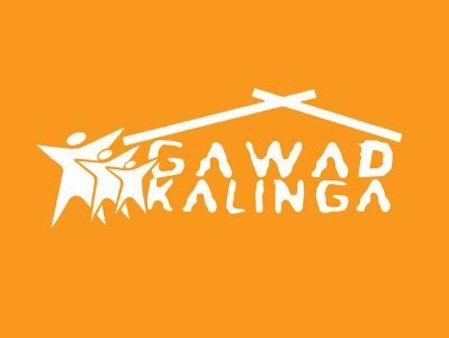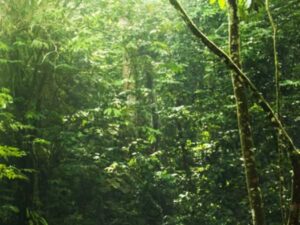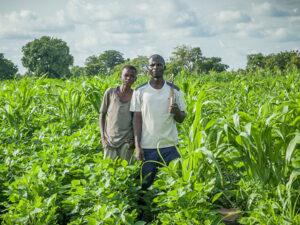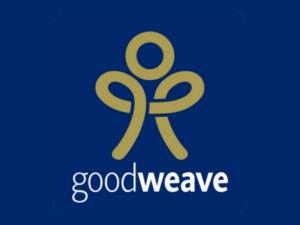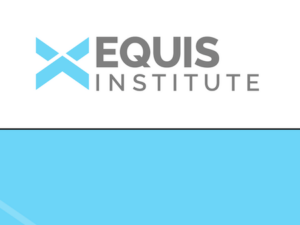Gawad Kalinga works with volunteers and partners on nation-building and alleviating poverty in the Philippines.
Luis Oquiñena of Gawad Kalinga spoke with Divya Manocha on April 13, 2023. Click here to read the full conversation with insights highlighted.
Divya Manocha: To begin, could you please introduce yourself, talk about the problem you’re addressing, and how you’re responding to it?
Luis Oquiñena: I’m Luis Oquiñena. I am now chair of Gawad Kalinga Foundation, otherwise known as GK. We are a 2012 Skoll awardee, and what we’re trying to address right now in a systems level issue in food systems dealing with production. We want to make each square meter of land productive for smallholder farmers so that, hopefully, it will be a path to end their own poverty. That’s what we’re trying to do today in the Philippines as Gawad Kalinga.
Divya Manocha: Who are the people you are serving and how do you engage with them?
Luis Oquiñena: In the Philippines right now, there are 5.5 million families, almost one fourth of the population, that are considered the poorest. They are the families that have multiple vulnerabilities, from climate to gender and even conflict. Of the 5.5 million families, close to 3.7 million are farmers and fisher folks. Sadly, they’re the ones feeding us and yet they’re the poorest, so there is something wrong there.
We decided to try to tackle that issue by, one, organizing them into community-based enterprises. These enterprises have 10 to 12 farmers as a production unit, where they can plant and harvest together, where we can invest in the poor and not just look at them as a market for credit. The average age of these farmers is actually almost 60 years old, so they’re quite old. Our farmers are getting older by the day and that’s why we feel there’s a sense of urgency to intervene in the situation. The average number per family is about five to a household and most of them are not able to reach grade three in education. So they are one of the most uneducated or unschooled sectors in the country as well.
We intervene on several levels. Aside from us organizing them, we actually invest in their production. We put equity in the production through financial investments, not loans nor donations. We venture with these farmers. The question for us is, what is the equity of the farmer? We needed to create a new currency for them because they don’t have money, so what assets do they have that can be converted into equity, and therefore capital as well? Their sweat and their skills being farmers are, to me, their most valuable asset. We put value to that in the venture. We’re also able to connect their produce either to market or to a value adding processing.
Divya Manocha: What makes GK and its approach different from other community development services?
Luis Oquiñena: One is, we are trying to build what we call a preferential wealth creation ecosystem for them, where we’re flipping the profit sharing proportions. The poor get a higher share of the whole pie. In normal business transactions, whoever takes on the higher risk takes on the higher profit. With us, we take the higher risk, but we share a higher profit for the poor. Unless we do that, I don’t believe we can propel the farmers out of poverty because there are too many disadvantages. We call it preferential wealth creation.
Secondly, what makes us different is we organize them into what we call community-based enterprises. It becomes their support system. It becomes their go-to group when they need labor, when they need help from each other. The third unique aspect is we assign to this group what we call our CEOs, the Community Enterprise Organizer. We actually organize an enterprise that also includes the management of the cash flow, making sure that everything is consistent with quality. Farmers are really good farmers, but their handicap is that they’re bad businessmen, so we assign a CEO who are also children of farmers. For us to be able to do that, we established our own agricultural school where our graduates become our CEOs.
This solves two things. One, we’re able to manage the business at the grassroots level. Secondly, we’re able to bring down the average age of farmers from 60 years because we’re now engaging their children to be farmer entrepreneurs. If you look at the three strategies that I shared, they make GK unique. From our business model to how we organize the farmers, and also how we are raising the next generation farmers.
Divya Manocha: Can you share an example that illustrates the impact of your work?
Luis Oquiñena: We have a group of farmers in Mindanao that plant purple root or purple yam. Right from the planting stage we might market their product to high-end restaurants or, in this case, to an online marketplace. The farmers planted the root, we processed the produce into a powdered form, a flour or, with this one, cocoa sugar. We introduce products planted by the farmers that we organize, we add value by processing them and also connecting them to the market. We are growing the footprint. This is a three-year-old experiment, which we were forced to do because of COVID. The innovation that occurred by adjusting to the situation was tremendous.
Our target now is by next year, we want to scale to 300 farmers organized and raise 30 CEOs. We now have about 10 of them, so we want to raise more CEOs and build more enterprises and engage more businesses to connect to this preferential wealth creation.
Divya Manocha: On the topic of impact, evidence, and success, how do you actually measure your success?
Luis Oquiñena: We have very modest targets. For each family who’s involved with the farming, our target is to address their being food poor. Being food poor in the Philippines means that you have to have at least a hundred US dollars a month dedicated to food alone. Not for medicine, not for clothing or rentals or education, but just for food alone. Most of the farmers that we’re serving are not able to cross the threshold. Success for us is our modest goal for the enterprise, which is to give them enough income to address their being food poor. It is part of our anti-hunger campaign. The actual measurement of success is income.
Divya Manocha: What insights or teachable lessons do you have from your experience with GK that could be useful to the activists, philanthropists, and journalists who might be reading this interview?
Luis Oquiñena: For us, since our main partners are the poor themselves, there is genius in them. At least one of the reasons why we’re able to do this is because we can connect resources and build capacity for them, but they have so much insight, Solutions are actually from them. We’re just storytellers of those solutions, of their dreams as well. My advice is whoever is your main client, or partner, or the sector that you intend to transform, they’re your number one teacher.
In our case, these are poor farmers, so how do you do that? You have to be present. You have to be with them as much as you can. You cannot do this remotely. That was one big challenge during the pandemic when mobility was restricted and it was difficult for us to have face-to-face discussions. Finally this year we’re able to begin to accelerate our projects because we learn each time we meet them. Presence and learning from the people or the sector that you’re trying to help.
Divya Manocha: Every social innovator learns as much from things that don’t work as they do from things that do work. Can you describe something that you tried that didn’t work and taught you an important lesson? This is ideally something that could help others learn as well.
Luis Oquiñena: We’re celebrating our 20th year this year, and I would say we’re a product of our mistakes as well. I don’t think mistake is the right word, but learning moments, because at the time we think it was the right thing to do, even if in hindsight we’re saying we should have avoided that.
One major learning moment that we had was, we invested in the farmers and allowed them to, on their own, do things without really organizing into a more cohesive unit. At first, it was good, but we weren’t able to do the second cycle because each one was overtaken by their own practical needs. Instead of reinvesting their profits, they spent it on some other things and we weren’t able to go to the second cycle of production. We learned from that, and that’s why we have our CEO model. That mistake cost us money, we lost funds there.
We also learned that you cannot force everybody to get on-board for the solution that we’re working on. If we force them, most likely, you will fail if it’s not really what they want. You can’t force a solution in a community that is not generally accepted, even if you really believe that that’s the only solution for them.
Lastly, each community is unique. We learn from the other areas and we try to adopt the good practices in one community and sometimes it doesn’t actually work. That’s why presence and listening is an important part of the process.
Divya Manocha: Aside from funding, because almost every social innovator faces the challenge of raising sufficient funding for their work, are there any other challenges that you have faced that you’d like to touch upon?
Luis Oquiñena: I’d like to add to the funding problem. It’s not only about raising funds, it’s about funds that are too restrictive, that do not give flexibility for groups like us to actually adopt what is needed on the ground. Sometimes, beneficiaries of grants and funds end up working for the fund rather than their own mission. It’s not about raising it, it’s about how these funds carry certain conditions that sometimes restrict the flexibility and the innovativeness of the grantee. It’s a challenge.
Case in point, during the height of the pandemic, Jeff and the leadership team of Skoll provided awardees, the community, with grants. And with that grant, they gave all the elbow room for us to use it however we saw fit, and we really appreciated it because it brought us from surviving the pandemic, because there was a crunch in our funding, to being more strategic, where we were able to start this momentum with the farmers. Now, it’s becoming our key source and our key program. So, I would say that it’s not just about raising funds, but it’s also about how restrictive the funds are. That is a key strategic challenge for nonprofits.
The second one, and we’re going through this, is for a nonprofit to think long term because sometimes we’re left to whatever funds that we’re able to raise. With GK, we’re trying to see how we will be by 2050 and develop the funding and develop the programming from that overarching vision, like any corporation that has billions. The only difference is we do not have billions, except that our currency’s our inspiration.
Nonprofits need to have courage to move forward into the future. As I mentioned earlier, this is our 20th year, but next year is the most important year for us, our 21st, because in 2003 we launched this 21-year-vision plan. It was an audacious goal. This year is a transition year for us because we want to launch our vision 2050 next year in food systems. There are new things that we want to do, building convergences and collaboration. Our vision 2050 next year, has three key strategic areas.
One, by 2050, the population of the Philippines will be among the youngest populations in the world. We will be 21 years old on average, 60% of the population will be below 15 years old, and 15% will be above 65. The key reflection for us is that it means that the poor will get younger and GK will be older by the day, so how do we become more relevant to the poor? That’s a strategic question that you cannot just plan for six months or one year. You have to look at the spectrum and start planning leadership transitions, thinking about how to raise more workers, how to engage the young and capacitate the young poor today so that they can respond to opportunities.
The second reflection for us is if 65% or 70% of the poorest people are in rural areas, these are the farmers, we want to develop a clearer path towards them and capacitate them so that they can end their own poverty in a more sustainable and equitable way. So that they will be incentivized to really work hard to be value creators as well.
Lastly, this is such a big problem; poverty. It interlocks with climate, with exclusion, so we launched a movement three years ago. We call it the 3Zero Movement Global Alliance, zero poverty, zero exclusion, and net zero carbon. We hope to engage entrepreneurs, startups, and even corporations to start looking at these three areas, poverty, exclusion and net zero carbon, which are basically an aggregation of the 17 SDGs.
If you’re a technical person, you will understand the value of zero because that is the only value where the three axes actually intersect; the X, Y and the Z. For us, it makes our goals more easily integrated for those actors because, say you are leading your own enterprise and your goal is to move toward zero, and who will believe that in the future zero has a value. That’s the philosophy behind the movement that we’ve co-organized with ACTED, which is a French NGO based out of Paris.
Divya Manocha: How are you working to advance system level change in your field? How do you ensure that you bring others along with you?
Luis Oquiñena: Exactly that posture of becoming convergence. If your role is a convener, like what we’re trying to do, for convergence or collaboration to happen, to be a systems orchestrator, one needs to make sure that your brand takes a back seat and the mission takes the front seat. This is quite difficult for many because, one, brand equity is almost everything. It equals funding. But if you want to be a systems orchestrator, you have to put your brand at the back seat and the mission ahead. That’s why we have the 3Zero alliance, so that everybody can converge and our brand takes a back seat.
We have a head office in Manila that’s a six-story building that was donated to GK, but we only use half of the third floor. Two years ago, just before the pandemic, we repurposed the whole building and we called it our 3Zero House where social impact actors visit and do work there. It’s a forum where they can collaborate even without GK. It’s a dialogue where – if you believe in zero poverty, zero exclusion, and net zero carbon as a goal – you’re welcome to work in the house. On the ground floor we have the collaboration cafe. On the third floor we have the resource center. We developed a multimedia center where startups can actually create content, which is quite a steep cost for them if they have to set up on their own. We also invited accountants and legal advisors so that whoever is in the building and part of the system that we are orchestrating, they can access different services.
Having said that, if you are a systems orchestrator, you need to put in some resources even if it is coming out of your pocket. We do this because we know, with our goal of ending poverty, we know we cannot do it alone. Investing in our weaknesses, the gaps, so that others can fill the gaps is a strategic investment even if it does not actually directly come back to us. It impacts the mission. If you want to be a systems orchestrator, you have to invest in the vision, in the reason why you’re orchestrating the system.
Divya Manocha: You mentioned your long term vision, how do you see your work evolving over the next five years?
Luis Oquiñena: This is a transition year for GK and we will be resizing and retooling in the next year. In the next five years, we will be building what we call productivity hubs. These are regional hubs where small communities can connect so that they can be mentored via a campus or a hub. We’re going to build seven of them in the next three to five years and they should connect 10,000 communities. From there, like a motherboard of a computer, we can start plugging in the right partners, plugging in the right programs and then, hopefully it will be like a superhighway towards 2050. But critical to question as well is the need to raise younger leaders. By 2050, I’ll be around 84 years old, so we need younger leaders who will still be productive by 2050. We are investing in 15, 16, and 17 year olds as part of that strategy in the next five years. That’s the dream and the hope, but it needs a lot of heart and hard work.
Divya Manocha: Is there anything we haven’t covered yet that you think is important to add and to share with those reading this interview?
Luis Oquiñena: I think what you’re doing is important. The world needs storytellers because we are in dire need of inspiration. There’s too much false information going around that makes the future, or even the present, seem very dire and gloomy. Just as we are looking at the social innovator and social entrepreneurs as important actors in transforming our world, I think people like you who are storytellers have an important role as well. You tell the story, you tell what is truthful, that there is more good happening than bad. There are solutions happening all over, they just need to be discovered and shared. The culture of doing good, not just being good because there are a lot of good people that just want to be good. They refuse to do good, or they refuse to lead. That is a challenge. There’s so much goodness, but very few good leaders. I believe there are more good people than bad, but these good people don’t step forward to volunteer and say, “I’ll do it.” This is why storytellers like you can hopefully move the hearts of good people to do something, to do good.
Divya Manocha: Thank you for talking with me today, it’s been very inspiring.
Click here to read the full conversation with insights highlighted.
Divya Manocha has been a LEDE Fellow with the Solutions Journalism Network and is the founder of SoJourn, a bootcamp that brings together university students from around the world to produce solutions journalism. SoJourn has led to the publication of several stories which now feature on the Solutions Story Tracker alongside the work of Pulitzer Prize-winning journalists. Divya’s current work focuses on making assistive technology more accessible and using the power of play to drive civic engagement.
* This interview has been edited and condensed.
Find other social change organizations working in the Philippines.

